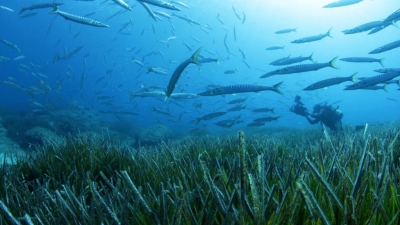
The Posidonia oceanica plant is an underwater grass known as “the lungs of the Mediterranean”.
Named after Poseidon, the Greek god of the sea, this “super plant” is the most widespread seagrass in the Mediterranean, living in tightly packed underground meadows that stretch hundreds of kilometres in length. The plant lives for more than 100,000 years making it one of the oldest organisms on Earth. It’s also highly effective at filtering the water and producing oxygen – 1 sq. metre of Posidonia produces as much oxygen as 1 hectare of the Amazon rainforest. The UNESCO World Heritage site around the Balearic Islands of Mallorca and Formentera includes about 55,000 hectares of Posidonia, which has global significance because of the amount of carbon dioxide the plant absorbs, given the effect of carbon dioxide on climate change. The plant faces threats from pollution, increased fishing activity, untreated sewage dumped into the sea and anchor dragging from oats.
Despite EU legislation to protect the species, Posidonia is in grave threat of disappearing in the next few decades. A combination of pollution, increased fishing activity, untreated sewage dumped into the sea, and anchor-dragging from of an increasing number of boats off the Formentera coast has wiped out more than 30% of the Posidonia meadows in the last few years and threatened the Mediterranean’s ecosystem.
Picture Credit : Google
Leave a Reply